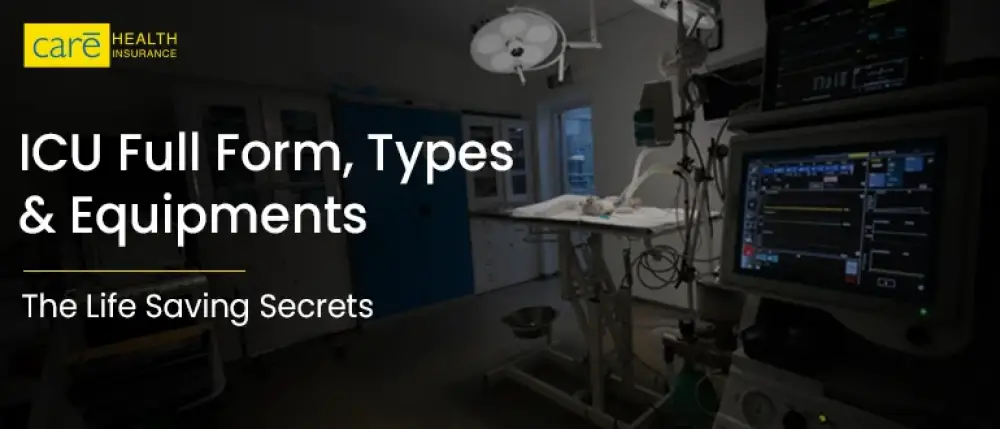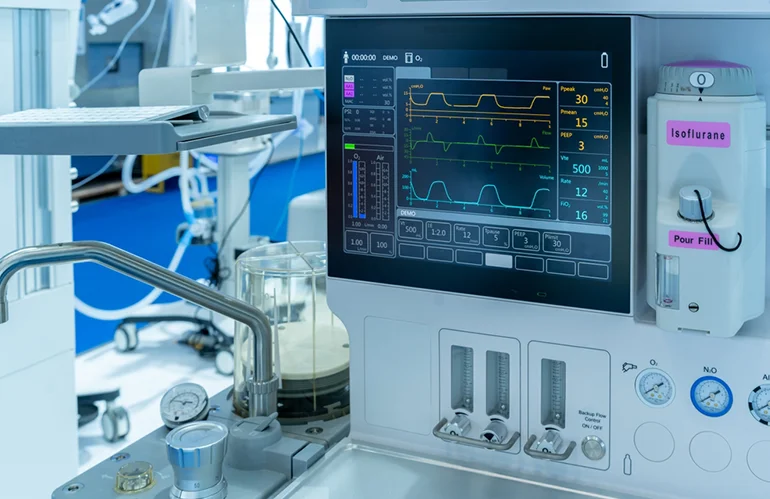Subscribe to get weekly insights
Always stay up to date with our newest articles sent direct to your inbox
Published on 14 Nov, 2024
Updated on 27 Mar, 2025
2083 Views
3 min Read

Written by Farina Khan
favorite0Like
favoriteBe the First to Like
The ICU is one of the most important departments in the hospital. But, are you wondering about ICU full form? Or confused about its usage in hospitals? Or curious to know about the essential equipment it may have? Well, no need to worry anymore. In this blog, we will take you through detailed information about ICU, ICU full form, its types, and the available equipment. Keep reading further for a quick sneak peak.
When there is a medical emergency that requires advanced medical attention you must have heard about the term ‘ICU’ several times. The ICU full form in medical terms is Intensive Care Unit. The term itself justifies the importance of this unit as highly critical situations are kept in a specialised ward referred to as ICU. Generally, ICU is categorised into five different categories. Keep reading to know further.
Now, as we have already discussed about the ICU full form, let’s have a look at the types of ICU in hospitals. Depending on the criticality of health condition of the patient, below ICU categories are designed in hospitals:

Since, the ICU full form is well established now, let’s proceed further with the requirement and common reasons for ICU admission. There may be various medical emergency situations where ICU admission remains the last option. These include:
>> Also Read: What is Pre and Post Hospitalization Coverage in Health Insurance?
As ICUs work as saviours in life-threatening conditions, it is essential to have a basic understanding of different ICUs available in the hospital. As we’ve already mentioned various types of ICU, one of the highly utilised ICU units which can’t be avoided is CCU. CCU stands for Cardiac Care Unit, which deals in treating people with heart conditions that require continuous monitoring . Let’s have a basic idea on how it differs from normal ICU:
| Intensive Care Unit (ICU) | Cardiac Care Unit (CCU) |
|---|---|
| Assistance to critically ill patients is provided | Assistance to heart patients is provided |
| Fully equipped with advanced life and monitoring systems | Cardiac monitoring, defibrillators, and EKG machines are the main equipment here |
| Treatment of conditions like sepsis and organ failure or accidents | Support to patients suffering from cardiac abnormalities |
| Trip duration minimum 2 days to maximum 365 days | No minimum trip duration with a maximum trip duration of 45 days or 60 days |
| This includes patients with trauma, surgery, etc. | This includes patients with acute coronary syndromes, heart attacks, etc. |
From a specialised team of doctors to modern and life supporting medical equipment, ICU plays a vital role in medical emergencies. The ICU is designed to provide the highest level of care and life-saving support to patients experiencing health emergencies. For those who find themselves in ICU, know that they are in the hands of skilled professionals dedicated to delivering the best possible care during critical emergencies.
Additionally, to protect your hard-earned savings from unplanned medical expenses, consider investing on a comprehensive health insurance plan. At Care Health Insurance, we offer multiple health plan options to cater to your unique needs. Just visit our website or allow our experts to help you know our comprehensive products.
Disclaimers: The above information is for reference purposes only: Policy Assurance and Claims at the underwriter's discretion.
favoriteBe the First to Like
शुगर कंट्रोल कैसे करे? जानें, डायबिटीज में क्या खाना चाहिए Vipul Tiwary in Health & Wellness
Thyroid : मामूली नहीं हैं महिलाओं में थायराइड होना, जानें इसके लक्षण और घरेलू उपचार Vipul Tiwary in Diseases
हाई ब्लड प्रेशर को तुरंत कंट्रोल कैसे करें? देखें इसके उपाय Vipul Tiwary in Diseases
प्लेटलेट्स की कमी के लक्षण, कारण और इलाज क्या है Vipul Tiwary in Diseases
5 Tips on Making the Most of a Health Insurance Top-Up Plan Mudit Handa in Health Insurance Articles
7 Private Health Insurance Waiting Period Traps to Watch Gungun Bhatia in Health Insurance Articles
Buying Health Insurance for Parents? Don’t Miss This Unlimited Recharge Feature Gungun Bhatia in Health Insurance Articles
Don’t Wait For the Unexpected: Get Accidental Insurance Now! Jagriti Chakraborty in Health Insurance Articles